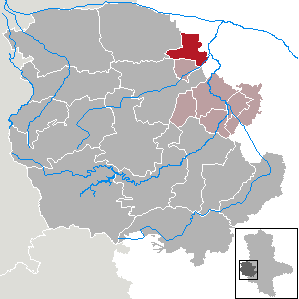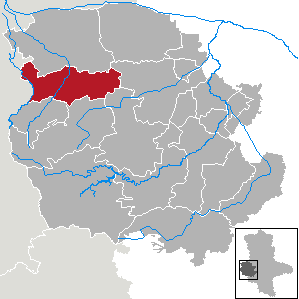
Güntersberge is a village and a former town in Harz District, in Saxony-Anhalt, Germany. It has held the status of an officially recognized resort town since 2001. Güntersberge, together with the other municipalities of the former Verwaltungsgemeinschaft Unterharz, merged into the town of Harzgerode as of 1 August 2009.

Schielo is a village and a former municipality in the district of Harz, Saxony-Anhalt, Germany. Since 1 August 2009, it is part of the town of Harzgerode. Basket weaving was common until in the early 20th century logging took over. Today agriculture, a number of small businesses, a caring home specialising in residential and nursing dementia care, as well as tourism related activities dominate the area.

Straßberg is a village and a former municipality in the district of Harz, Saxony-Anhalt, Germany. Since 1 August 2009, it is part of the town Harzgerode. Straßberg is located in southeastern part of the Harz mountains, 20 km south of Quedlinburg, 22 km northeast of Nordhausen and 23 km northwest of Sangerhausen.

Ilsenburg is a town in the district of Harz, in Saxony-Anhalt in Germany. It is situated under the north foot of the Harz Mountains, at the entrance to the Ilse valley with its little river, the Ilse, a tributary of the Oker, about six 6 miles (9.7 km) north-west of the town of Wernigerode. It received town privileges in 1959. Owing to its surrounding of forests and mountains as well as its position on the edge of the Harz National Park, Ilsenburg is a popular tourist resort. Since 2002, it is officially an air spa.

Alexisbad is a small spa town, part of Harzgerode in the district of Harz, Saxony-Anhalt, Germany.

Gerbstedt is a small town in Saxony-Anhalt, district Mansfeld-Südharz. It was traditionally dominated by copper mining, presently agriculture is dominant.

Falkenstein/Harz is a town in the Harz district, in Saxony-Anhalt, Germany. It was created in 2002 by merging the town of Ermsleben with the former municipalities of Endorf, Meisdorf, Neuplatendorf, Pansfelde, Reinstedt und Wieserode. The new community was named after Falkenstein Castle.

Laucha an der Unstrut is a town in the Burgenlandkreis district, in Saxony-Anhalt, Germany. It is situated on the river Unstrut, 13 kilometres (8 mi) northwest of Naumburg and 7 kilometres (4 mi) west of Freyburg. It is part of the Verbandsgemeinde of Unstruttal and is in the Saale-Unstrut wine region. On 1 July 2009 it absorbed the former municipalities Burgscheidungen and Kirchscheidungen.

Schwanebeck is a small town in the district of Harz, in Saxony-Anhalt, Germany. It is part of the Verbandsgemeinde Vorharz.

Osterwieck is a historic town in the Harz district, in the German state of Saxony-Anhalt.

Möckern is a town in the Jerichower Land district, in Saxony-Anhalt, Germany. It is situated east of Magdeburg. The Battle of Möckern took place south of the town in 1813.

Derenburg is a town in the district of Harz, in Saxony-Anhalt, Germany. Since 1 January 2010, it has been part of the Blankenburg am Harz municipality. Its population is 2,466 (2021).

Angern is a municipality in the Börde district in Saxony-Anhalt, Germany. On 1 January 2010 it absorbed the former municipalities Bertingen, Mahlwinkel and Wenddorf. The municipality consists of the Ortsteile Angern, Bertingen, Mahlwinkel, Wenddorf and Zibberick.

Hötensleben is a municipality in the Börde district in Saxony-Anhalt, Germany.
Neudorf is a village and a former municipality in the district of Harz, in Saxony-Anhalt, Germany. Since 1 September 2010, it is part of the town Harzgerode.

Wallhausen is a municipality in the Mansfeld-Südharz district of Saxony-Anhalt, Germany. It is located on the Helme river north of the Kyffhäuser mountain range and the border with Thuringia. Wallhausen is part of the Verbandsgemeinde Goldene Aue. The municipality consists of the 4 villages Wallhausen, Hohlstedt, Martinsrieth and Riethnordhausen. The former municipalities Martinsrieth and Riethnordhausen were absorbed into Wallhausen in July 2009.

Oberharz am Brocken is a town in the Harz District, in Saxony-Anhalt, Germany. It was formed on 1 January 2010 by the merger of the town of Elbingerode with the municipalities of the former Verwaltungsgemeinschaft Brocken-Hochharz.

Nordharz is a municipality in the district of Harz, in Saxony-Anhalt, Germany.

Selke-Aue is a municipality in the district of Harz, in Saxony-Anhalt, Germany. It was formed on 1 January 2010 by the merger of the former municipalities Hausneindorf, Heteborn and Wedderstedt.

Südharz is a municipality in the Mansfeld-Südharz district, Saxony-Anhalt, Germany. It was formed on 1 January 2010 by the merger of the former municipalities Bennungen, Breitenstein, Breitungen, Dietersdorf, Drebsdorf, Hainrode, Hayn, Kleinleinungen, Questenberg, Roßla, Rottleberode, Schwenda and Uftrungen. Wickerode and the town Stolberg were added in September 2010. These 15 former municipalities are now Ortschaften or municipal divisions of Südharz.

























